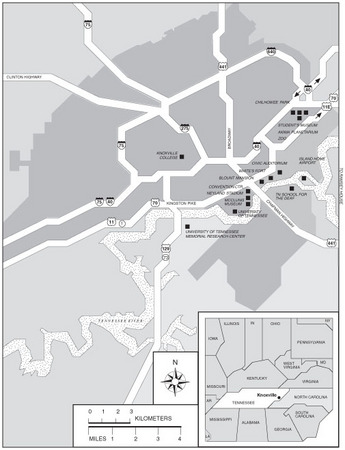Knoxville
Knoxville: Geography and Climate
Knoxville: History
Knoxville: Population Profile
Knoxville: Municipal Government
Knoxville: Economy
Knoxville: Education and Research
Knoxville: Health Care
Knoxville: Recreation
Knoxville: Convention Facilities
Knoxville: Transportation
Knoxville: Communications

The City in Brief
Founded: 1786 (incorporated 1791)
Head Official: Mayor Bill Haslam (R) (since 2003)
City Population
1980: 175,045
1990: 169,761
2000: 173,890
2003 estimate: 173,278
Percent change, 1990–2000: 2.4%
U.S. rank in 1980: 77th
U.S. rank in 1990: 101st (State rank: 3rd)
U.S. rank in 2000: 135th (State rank: 3rd)
Metropolitan Area Population
1980: 546,488
1990: 585,960 (MSA)
2000: 687,249 (MSA)
Percent change, 1990–2000: 17.3%
U.S. rank in 1980: 60th (MSA)
U.S. rank in 1990: 65th (MSA)
U.S. rank in 2000: 62nd (MSA)
Area: 92.7 square miles (2000)
Elevation: Approximately 936 feet above sea level
Average Annual Temperature: 60.0° F
Average Annual Precipitation: 48.2 inches
Major Economic Sectors: wholesale and retail trade, services, government
Unemployment rate: 3.3% (December 2004)
Per Capita Income: $18,171 (1999)
2002 FBI Crime Index Total: 11,983
Major Colleges and Universities: University of Tennessee at Knoxville, Knoxville College, Pellissippi State Technical Community College
Daily Newspaper: The Knoxville News-Sentinel
